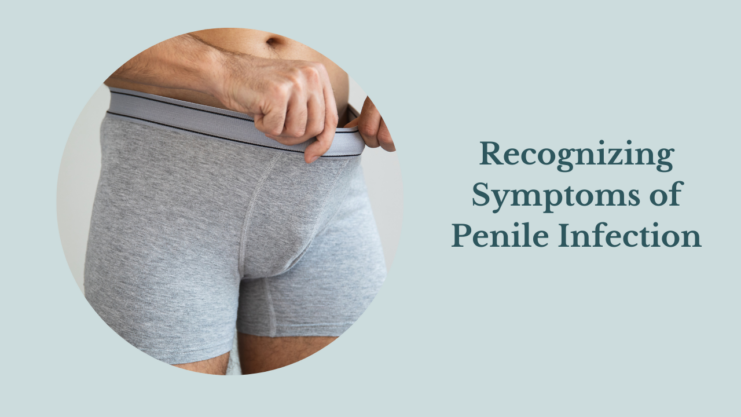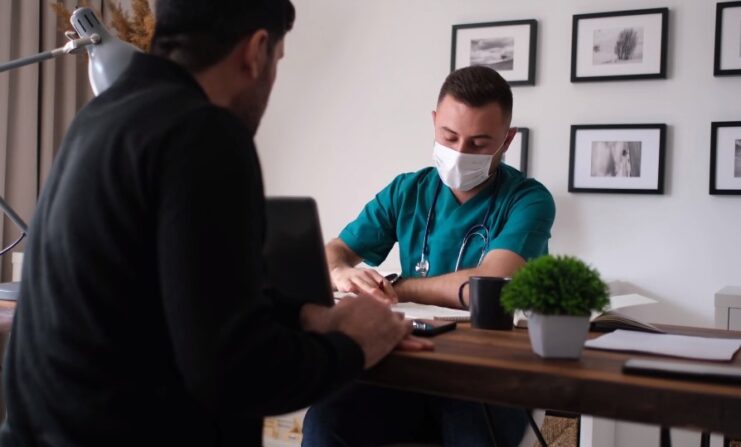Understanding various health conditions, their causes, symptoms, treatments, and preventative measures is pivotal in maintaining our overall well-being. One such condition that predominantly affects males, specifically those who are uncircumcised, is Balanitis. This common infection targets the glans (head) of the penis and the foreskin, often causing discomfort and necessitating medical attention.
This article aims to provide a comprehensive overview of Balanitis, discussing when to seek medical help, effective treatments, and the impact on sexual activity. Through a deeper understanding of this condition, individuals can better manage their health, ensuring early detection, appropriate treatment, and prevention of potential complications.
Recognizing Symptoms of Penile Infection

Those with this infection often experience:
- A sore, itchy, and odorous penis
- Redness and swelling
- Thick fluid accumulation around the penis
- Pain during urination
- For some adults, a condition known as phimosis, or a non-retractable foreskin, may also present itself and increase the risk of balanitis.
Understanding Causes of Balanitis
Several factors contribute to the onset of Balanitis, including:
- Poor hygiene: This could lead to a buildup of smegma – a mixture of dead skin cells, oil, and other bodily fluids at the penis tip. Neglecting to clean this buildup can lead to painful consequences. Smegma often has the following characteristics:
- Thick, cheese-like consistency
- A color usually white (may vary with natural skin tone)
- Unpleasant odor
- If left for long periods, it can precipitate balanitis.
- Irritation: Irritation under the foreskin is caused by urine, soaps, shower gels, and other skin irritants.
- Thrush: This fungal infection caused by Candida needs antifungal treatment.
- Bacterial Infection: Consultation with a doctor and subsequent antibiotic treatment is necessary.
- Sexually Transmitted Infection (STI): Symptoms usually appear days or weeks after unprotected oral, anal, or vaginal intercourse. Doctor consultation and specific antibiotic treatment are required.
- Skin conditions: Conditions like eczema, psoriasis, and lichen sclerosus.
When to Consult a Doctor

While experiencing occasional discomfort or irritation may be normal, it’s important to be vigilant for persistent or worsening symptoms. A doctor should be consulted if you notice swelling, redness, or irritation that doesn’t improve with time. Remember, early detection often leads to more effective treatment and can prevent potential complications from developing.
In addition to these signs, also keep an eye out for unusual penile discharge or painful urination. These symptoms could be indicative of a more serious underlying issue such as a bacterial infection or a sexually transmitted infection. Ignoring these symptoms can lead to further complications and discomfort. Therefore, seeking prompt medical attention is essential to ensure a proper diagnosis and effective treatment plan.
Treating Balanitis
The treatment of balanitis primarily hinges on two factors: maintaining good hygiene and using appropriate medical interventions. Hygiene practices should include regular cleaning of the penis with lukewarm water, avoiding potential irritants, and drying gently under the foreskin after urination. These actions can significantly reduce inflammation and discomfort associated with balanitis, promote healing, and prevent further complications.
In conjunction with good hygiene, your healthcare provider may recommend specific creams or ointments depending on the cause of balanitis. These could include steroid creams for simple skin irritation, antifungal creams or tablets for yeast infections, and antibiotics for bacterial infections.
Each of these treatment options targets a specific cause, reinforcing the importance of an accurate diagnosis for effective management of balanitis. Always follow the prescribed treatment regimen and do not hesitate to reach out to your doctor if symptoms persist or worsen.
Hygiene Practices
For those with balanitis, the following hygiene practices are recommended:
- Daily cleaning of the penis with lukewarm water and gentle drying.
- Avoidance of soap, bubble bath, shampoo, or any other potential irritant.
- Gently drying under the foreskin after urination.
- Using a soap substitute like an emollient, available at a pharmacy.
Creams and Ointments
Depending on the underlying cause of balanitis, your GP might recommend:
- Steroid cream or ointment for simple skin irritation.
- Antifungal cream or tablets for yeast infections.
- Antibiotics for bacterial infections.
- Circumcision may also be suggested for recurrent cases of balanitis.
Balanitis and Sexual Activity

Balanitis, depending on its cause, can have varying implications on a person’s sexual activity. If the condition is not triggered by an infectious agent, such as a bacteria or fungus, engaging in sexual activity during treatment is generally safe. It’s essential, however, to ensure that any physical discomfort caused by balanitis symptoms, like swelling or redness, doesn’t lead to further damage or pain during sexual intercourse.
On the contrary, if balanitis is caused by an infectious agent, such as a sexually transmitted infection (STI) or thrush (a type of yeast infection), sexual activity should be avoided. The reason is, these conditions can be easily transmitted to a sexual partner, resulting in their infection as well.
Maintaining open and honest communication with your partner about your condition is crucial during this period. It not only safeguards the health of your partner but also aids in the successful management of your condition. Once your treatment is complete and your healthcare provider gives the all-clear, you can resume sexual activity, always bearing in mind the importance of practicing safe sex.
Prevention of Balanitis
Practicing the following habits can help prevent balanitis:
- Keeping the penis clean.
- Avoiding harsh soaps and skin irritants.
- Using soap substitutes such as an emollient.
- Practicing safe sex to avoid an STI.
- Using latex-free options.
FAQs
How can I maintain proper hygiene with Balanitis?
To maintain proper hygiene, clean your penis daily with lukewarm water and dry it gently. Avoid potential irritants like soap or bubble bath, dry gently under the foreskin after urination, and try using a soap substitute like an emollient.
Is circumcision a treatment option for Balanitis?
Yes, circumcision, which is the surgical removal of the foreskin, may be suggested by your GP in recurrent cases of balanitis.
Can I engage in sexual activity while treating Balanitis?
If your balanitis is not caused by an infection, sexual activity can continue. However, if the balanitis is due to an infection like an STI or thrush, sexual activity is not recommended due to the risk of transmission.
How can I prevent Balanitis?
To prevent balanitis, keep your penis clean, avoid harsh soaps and skin irritants, use soap substitutes such as an emollient, practice safe sex to avoid STIs, and consider using latex-free options.
Can Balanitis lead to serious complications?
If left untreated, balanitis can cause complications such as an inability to retract the foreskin, painful urination, and in rare cases, an increased risk of penile cancer.
Does Balanitis only affect uncircumcised men?
While it’s more common among uncircumcised men due to the moist environment under the foreskin that can facilitate bacterial growth, circumcised men can also develop balanitis. It’s crucial for both circumcised and uncircumcised men to maintain good penile hygiene.
Conclusion
Balanitis, while common and often uncomfortable, is usually manageable with proper hygiene and appropriate treatment. The insights gained from this discussion underline the critical importance of regular personal hygiene, awareness of irritants, and the necessity of safe sexual practices in minimizing risks.
Ultimately, understanding balanitis, its triggers, and preventative measures fosters healthier individuals and communities. This knowledge empowers us to make informed decisions about our personal health and well-being, enabling us to maintain a high quality of life while reducing the burden on healthcare systems. Let this be a reminder that good personal hygiene is a cornerstone of health, and not to shy away from seeking medical advice when something doesn’t feel right.













